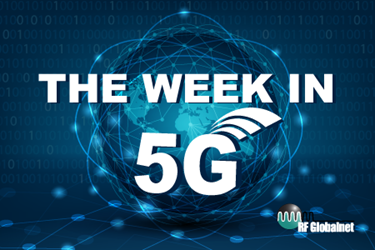The Week in 5G: 10/20/2020 — European Commission Urged to Fight 5G Misinformation; 5G Tech to Support 4G on Moon
By Ed Biller

NASA has awarded more than a dozen companies a total of $370 million to deploy technology, including a 4G LTE network, on the lunar surface, CNN Business reports. “Nokia's Bell Labs was granted $14.1 million for the project… [and] will partner with spaceflight engineering company Intuitive Machines to build out the 4G-LTE network,” states the report.
However, rather than use the large cell towers, power generators, and radios that enable 4G on earth, Bell Labs will leverage small cell technology developed for 5G use, since it is easier to transport and requires less power.
In tech news, Apple touted last week its new iPhone lineup. The tech giant will sell four new iPhone models simultaneously: “the 5.4-inch iPhone 12 Mini, 6.1-inch iPhone 12, 6.1-inch iPhone 12 Pro and 6.7-inch iPhone 12 Pro Max,” reports CNET.
All four handsets include 5G connectivity — though mmWave 5G connectivity is only available in U.S. models — as well as an updated design, more robust screen glass, and an updated chip.
Also, FreedomFi Gateway — a commodity, x86 network appliance that helps users build their own private LTE or 5G network “using source software and small cell radios” — now is available in public beta.
“FreedomFi will be demonstrating an end-to-end private cellular network deployment during their upcoming keynote at the Open Infrastructure Summit and publishing step-by-step instructions on the company blog,” states a company press release.
Meanwhile, Verizon announced this week deals with Microsoft and Nokia aimed at improving Verizon’s ability to target business customers “by offering clients the ability to automate factory floors, lower costs and speed up data traffic through private 5G networks,” reports Reuters.
The report states Azure, Microsoft’s cloud computing business, will run atop of Verizon’s 5G network “to processes the data generated by machines at the local facility and use artificial intelligence to automate operations.”
In network rollout news, French mobile operators are currently testing 5G services with a total of 483 active 5G base stations across the country, reports RCR Wireless, citing French press. France is the only one of the five most populous European Union countries where 5G is not yet commercially available, the report notes.
French regulator Arcep completed its main auction for 3.4-3.8 GHz frequencies earlier this month and has stated a frequency positioning auction would be held this month to determine how these frequencies will be positioned in the 3.4 -3.8 GHz band, giving “winning bidders an opportunity to express their preferences regarding their position on the band.”
Arcep also has specified that each successfully bidding operator must launch 5G services in at least two cities before the end of 2020. Each carrier should deploy 3,000 sites by 2022, 8,000 sites in 2024 and 10,500 sites by 2025.
The U.S., too, is lagging in its 5G network rollout, so much so that “White House Chief of Staff Mark Meadows is leaning on the Pentagon to move ahead with a plan to stand up a 5G wireless network… despite opposition from key government and private-sector players,” reports Axios.
The report states the much-maligned idea could outlive the Trump administration, should Democratic challenger Joe Biden win the 2020 U.S. election, the national-network idea is touted as a way to edge out China in the race to build the best next-gen wireless technology, as well as a way to bring high-speed wireless internet to rural America.
Finally, 15 European Union (EU) member states have teamed to urge the European Commission “create a long-term strategy to counteract the spread of misleading information related to 5G networks, and highlight the environmental and digital transformation benefits of the technology,” reports Mobile World Live.
The request seeks “active, long-term and systemic approach” to combatting disinformation regarding electromagnetic fields (EMFs) and 5G, as well as an awareness campaign based on established science, to curb both vandalism against network infrastructure and disinformation that hinder“ the ability for the European Union to meet its ambitious 5G goals.”
